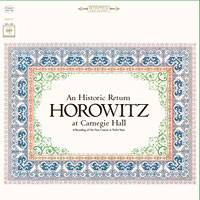Vladimir Horowitz • Horowitz at Carnegie Hall
 hen Vladimir Horowitz took the long
walk across the stage of Carnegie Hall in May 1965, he was making his first public
performance in twelve years -- a lifetime for a performer. At age 62 and already a
near-legendary concert pianist, Horowitz was making a handsome living from record sales, a
good thing because he was seriously reluctant about performing in public. Ironically -- at
least for us audiophiles -- after learning his records didn’t sound like the real
thing, Horowitz knew he had to perform live. hen Vladimir Horowitz took the long
walk across the stage of Carnegie Hall in May 1965, he was making his first public
performance in twelve years -- a lifetime for a performer. At age 62 and already a
near-legendary concert pianist, Horowitz was making a handsome living from record sales, a
good thing because he was seriously reluctant about performing in public. Ironically -- at
least for us audiophiles -- after learning his records didn’t sound like the real
thing, Horowitz knew he had to perform live.
To open the concert, Horowitz chose an 18-minute trial by fire, Ferrucio Busoni’s piano transcription of Bach’s Toccata in C Major. Horowitz knew the piece well and it was comfortable to him. With a master’s touch and timing evidenced by his ability to achieve finely graded dynamic differentiation within phrases, Horowitz wove his unique brand of tonal artistry with grace and amazing speed. The performance was brilliant, and the audience went wild. From the Bach-Busoni, Horowitz proceeded to Schuman’s Fantasy in C Major, where his hand-over-hand technique ranged across the octaves with amazing dexterity, sounding at times as if he had three hands. Along with his masterly use of the pedals, Horowitz’s tonal density and exquisite touch -- from the lightest pianissimo kiss to declaratively firm power -- effected a fantastical atmosphere. The three long movements of this and other Schumann pieces can be difficult to pull together, yet in this concert Horowitz showed where his true genius lay. American pianist John Browning put it well: "In Horowitz’s playing, many people hear the speed, they hear the glitter, but they don’t hear the ten voices working at once, all separately, and they don’t hear the incredible way Horowitz can unify a work that really has no structural unity." After intermission, Horowitz performed two Scriabin pieces in tribute to the composer: the Sonata in F Major, aka the “Black Mass,” and the Poem in F-sharp Major. Horowitz had performed for Scriabin in his youth, and it was the fiftieth anniversary of the composer’s death. Horowitz conjured the mystical Scriabin to life, and we hear the darker dissonance of the mysterious Ninth Sonata delivered with wonderfully lyrical flow -- again Horowitz’s interpretation makes sense of an enigmatic piece. This is juxtaposed with the lighter romantic impressionism of the Poem. Horowitz chose to conclude the program with three pieces from Chopin, "because he is Chopin": a mazurka, an etude and a ballade. His artistry here was obvious, and these pieces will tell you why Horowitz had such regard across the globe. The audience applauded like crazy. Four encores were planned and Horowitz played them all: Debussy’s Serenade for the Doll sounds simpler than it is, a real charmer; Scriabin’s Etude in C-sharp Minor, and Moszkowski’s short Etude in A-flat Major, written as an exercise for right-hand finger control. Horowitz flew through it at blinding speed, note perfect. The final piece was Schumann’s "Träumerei" (Dream) from his Scenes from Childhood, perhaps the best known piece of the entire concert. From opening applause to final encores, this Speakers Corner reissue of Columbia’s live concert set the scene, offering an electricity-in-the-air feeling and an audience that knew the compositions and appreciated -- no, loved -- the performer. Here is a trip back to another era, with excellent sound. The listener’s perspective is one where you’re looking at Horowitz on stage, almost from overhead. The piano sits with its lid open to the audience, its sound very clear and well balanced as individual notes and chords are easily discernible for right and left hands. For presenting a solo piano on a large stage, the microphone placement was reasonably but not overly close, giving an open yet intimate sense of the instrument. The soundfield occupies the space between the speakers, neither splayed nor narrowed. In other words, the context seems just right, although the Schumann Fantasy on side 2 was slightly canted to the left channel. The audience is no more annoying than at any live performance, and their applause made me jump -- it sounded live. Horowitz’s 1965 performance at Carnegie Hall was
truly a triumphant return -- he won two Grammy’s for the album. Happily, Speakers
Corner returns us to the event with a pair of well-made vinyl records. As a moment in
time, they deliver a thrilling and magical slice from the past with one of the greatest
pianists of the 20th century. |
